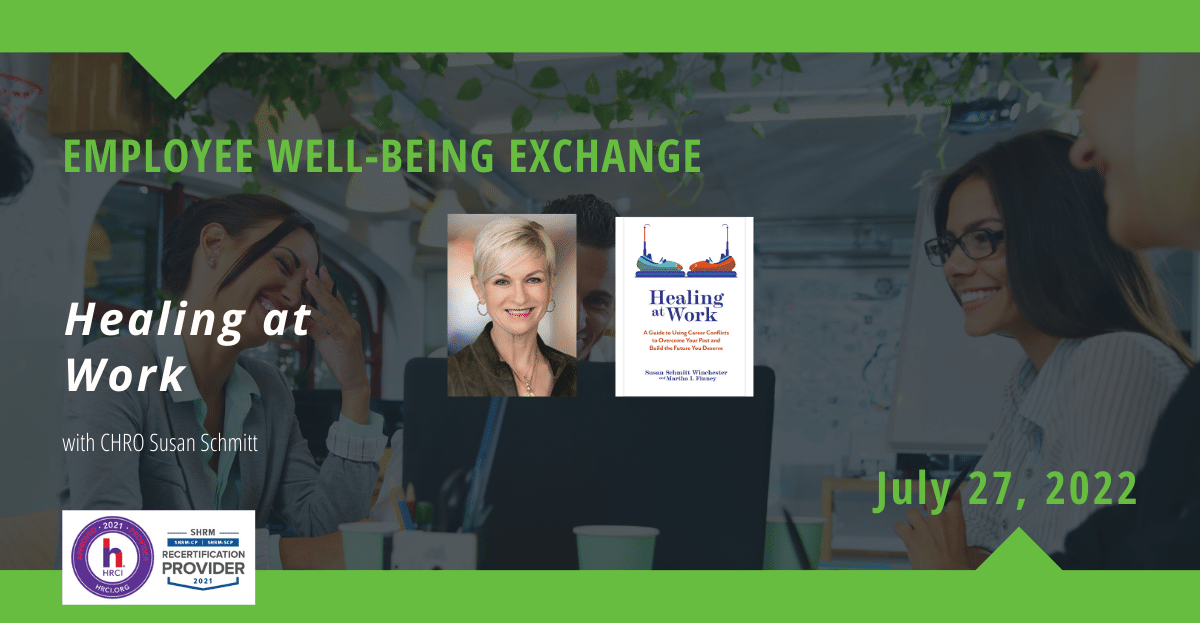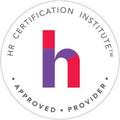
Healing at Work with CHRO Susan Schmitt Winchester
What is necessary to fully heal in the workplace? Susan Schmitt Winchester, CHRO at Applied Materials and co-author of Healing at Work: A Guide to Using Career Conflicts to Overcome Your Past and Build the Future You Deserve, joined the exchange to discuss how the workplace can provide opportunities to replace limiting beliefs and behaviors with positive, supportive beliefs, insights, skills, and experiences to build a successful career. This was a special meeting where we took time to consider how this lens helps us to better understand ourselves and we show up at work. In this field of work, we must start by healing ourselves before we can effectively support well-being for others.
Top 4 things we explored.
- How much our past can affect our careers. For example, our limiting beliefs affect our reactions at work. Susan shared examples of what this can look like and calls it the unconscious wounded career path. The costs of this path are high as it leads to stress, anxiety, and worry.
- The ACES model and ASDP term. Our adverse childhood experience (ACE) history counts experiences of negative things and family challenges that happened to us before the age of 18. Of the 8 categories, one study showed that 64% of people have at least one ACE. Adult survivors of a damaged past (ASDP) do well to acknowledge what has happened in the past, but recognize they have control of their present and future.
- Neuroplasticity can help us move forward. We have a choice. We can recognize that the rest of our life is ours, and we can change how we think and behave by using neuroplasticity. As a result, we’ll achieve things like less toxic cultures, improved relationships, and work/life balance.
- Bumper car moments are a catalyst to change our mindset and behavior. Workplace conflict can feel like a bumper car moment. Everyone brings their past and present to the workplace, and sometimes we can bump into each other. These moments can be a catalyst to recognize old belief systems and outdated scripts.
Great questions we heard.
Q: What is a strategy we can use in the workplace to help others deal with bumper car moments?
A: Have a one on one conversation framed with curiosity. When we see someone’s reaction to a scenario that seems “over the top”, that’s a clue the person is reacting to an unconscious experience or belief about themselves.
We can ask them questions like:
- What was going on in the moment for you?
- What did you take that to mean? What does it mean about you?
- Have you ever had this feeling before?
- Is it possible that prior experience is fueling your reaction to this moment?
- What can I do for you?
Q: How do we help ourselves approach bumper car moments (and not avoid them).
A: Decide our own worthiness. We often use avoidance behaviors like turning to alcohol and other mechanisms that help us “stuff things down”. But this causes major health issues.
Instead, we need to take ownership of our issues so we can spend less time being stressed in a triggered state of emotional response and more in a place of discovering deeper levels of self-acceptance. Ultimately, we need to recognize that no one else gets to decide what my worthiness is.
Q: What’s our first step to take this back to our employees?
A: Connect them to things like development programs, offering mental health therapy, and other one on one modalities.
Let’s keep thinking about ways we can do this in a future call (and reach out if you have tools you’re using in your organization).
Susan’s Bio:
Susan Schmitt Winchester is the Senior Vice President, Chief Human Resources Officer for Applied Materials, a Fortune 200 Silicon Valley company, and its more than 24,000 global employees. She has more than 30 years of experience in HR providing executive leadership most recently as Head of HR for Rockwell Automation and prior to that in multiple leadership roles for the Kellogg Company. She continually looks to meet today’s global business challenges with creative HR strategies that engage people, support a dynamic, inclusive corporate culture, and enable company exceptional performance. Her passion is teaching and inspiring executives, leaders and professionals how to succeed by discovering greater self-acceptance, fulfillment and joy at work and in life.
Susan is also the author of the book, Healing at Work: A Guide to Using Career Conflicts to Overcome Your Past and Build the Future You Deserve, with Martha I. Finney.
Additionally, Susan is a fellow of the National Academy of Human Resources—the highest professional honor for leaders in HR. She serves as a Board member for the HR Policy Association and on the Executive Committee of the Peer Roundtable for CHROs. She is Vice Chair, Leadership Advisory Board to the Dean of Engineering, College of Engineering at the University of Michigan, and a member of the Forbes HR Council.
Building on groundbreaking research by both i4cp and Rob Cross, the Employee Well-Being Exchange is a peer-driven community working group that explores the relational sources of well-being, how personal networks impact this, and the tools to support individual performance and well-being.
log in

